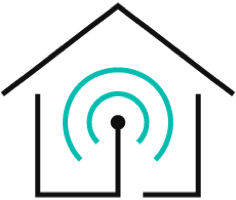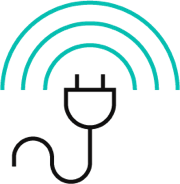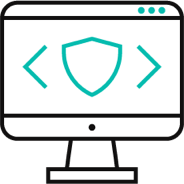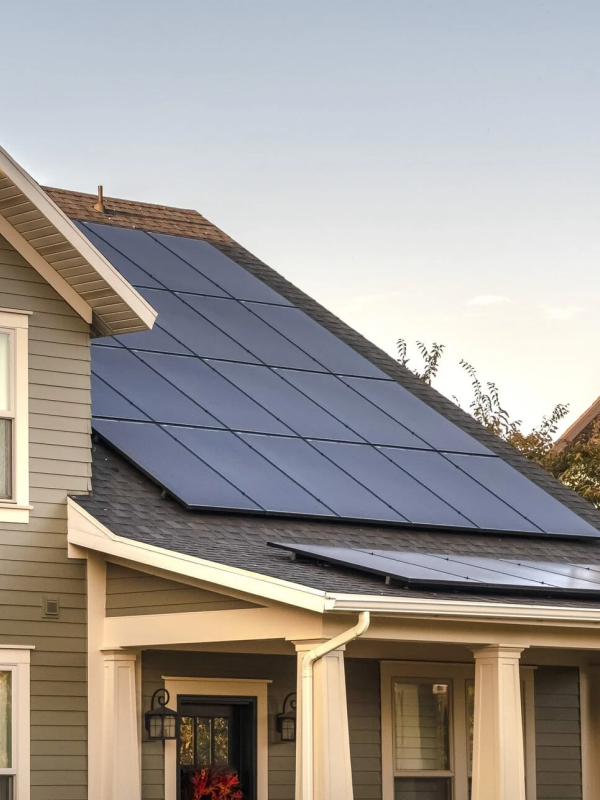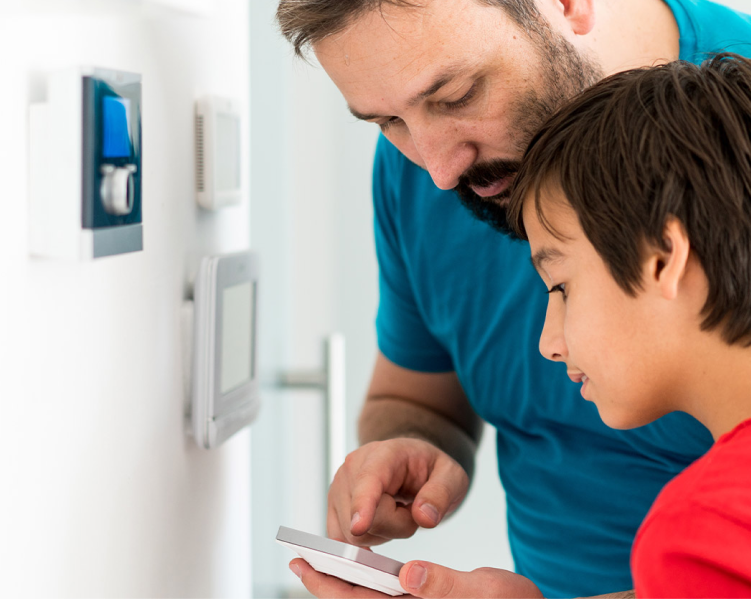Solar power as a sustainable energy source for home is not a foreign idea. It’s renewable, environment friendly, saves money, and can potentially replace the demand for fossil fuel if used efficiently. Plus, with the constant rise of energy prices, more and more homeowners are entertaining the idea of having a solar system for their homes.
But creating a solar system for a complete home requires planning and appropriate knowledge. And just like any other system, it’s not without its drawbacks. Nevertheless, the number of benefits widely makes up the few disadvantages.
Let’s see everything you need to know to plan a solar power system for your home to save energy.
- How Much Power Does A Home Use?
- Can I Run My Entire House On Solar Power?
- Is Solar Power Worth Its Homeowner?
- How To Monitor Power Use At Home?
- How To Ensure Power Backup Of Solar Power Systems For Home?
How Much Power Does A Home Use?
It’s not entirely possible to estimate how much power a home uses precisely. But from different data, we can take a guess.
From recent data, the amount of electricity a home in the USA uses per year on average is approximately 10,700 kilowatt-hours (kWh). Meaning, the average power usage per month is around 891 kilowatt-hours (kWh).
Dividing 10,700 kWh with 365 days, we can get the amount of daily energy consumption which is about 29 kWh or 29000 watt-hours. We have 24 hours a day which means the final average is about 1208 watts (W) per day.
So, a typical household uses around 1208 watts daily on average.

Can I Run My Entire House On Solar Power?
A very customary question homeowners ask when deciding to set up solar panels at home is if they can run the entire house solely on solar power. The answer is YES. It is absolutely possible to power your entire house with solar power as long as you look out for a few variables.
In fact, you can quite efficiently go totally off the grid and create a self-sufficient house in the process.
Nevertheless, going entirely solar-dependent needs extensive knowledge and planning. You will need to think about everything in detail from monitoring how much energy your home needs regularly, how many solar panels you will need, where to install them, how to maintain and distribute the energy, and many more.
Is Solar Power Worth Its Homeowner?
Setting up solar panels for a home is a quite costly project. Thus it should bear enough benefits to offset the cost and be worth the money you are spending on it.
So let’s see the advantages and disadvantages of buying a solar power system for a home.

Advantages
- Renewable Source Of Energy
The most important benefit of solar power is that it is a renewable energy source. Especially, since most non-renewable energy sources are running out slowly, we need to be more adaptable and dependent on renewable sources.
Solar energy will be available as long as we have the sun, even long after all other energy sources have been used up. It is the future of modern civilization.
Setting up solar power for more homes can help prepare us for the future.
- Save Money On Energy Bills
The next big benefit that comes with solar power is the drop in energy bills. Since you are generating your own power and not using commercial utility lines, the electricity bill decreases significantly.
In fact, you can even get paid by selling the excess power you generate to the utility. With the increasing electricity price, this is a win for the homeowners.
- Almost No Maintenance
After the initial setup, there is basically no maintenance needed for solar power. Almost all solar panels come with a 20-25 years warranty. There is little to no wear having no moving parts, except for the inverter. And even that will need replacement after a good 5 to 10 years.
The cables might need some maintenance too once in a while.
Other than a good cleaning and a few routine check-ups, you can leave them alone completely. There are even cleaning companies now that will do the cleaning for a very affordable deal.
- Miscellaneous Applications
The application of solar power is extremely versatile. Meaning you can use them for almost anything, even where usual fossil fuel is not efficient.
From powering the home, and operating different electrical devices to supplying power to remote places where the usual grid line is not available, solar power has application scopes everywhere.
- Environment-friendly
Not only does it personally benefit the homeowners but also solar power is completely environmentally friendly. Unlike fossil fuels, it does not generate any smoke or volatile elements that might pollute the surroundings.
Also, as the temperature of the earth is increasing day by day, it’s our responsibility to take care of our environment. Solar energy can play a big role in preserving nature.
- Increase Home Value
Having options to use solar power increases the home value when reselling it to homebuyers. With all the benefits, having solar panels also ensures you can go off-grid whenever you want.
Especially among people who are more environmentally conscious, solar power is a popular energy choice.
Disadvantages
- High Initial Cost
The high initial cost of buying and setting up solar panels is one of the main reasons why many homeowners turn away from it. The whole setup requires quite a few elements such as an inverter, panels, cables, battery, etc. All of these costs quite an amount plus the installation cost.
However, considering it’s a long-term investment plus the benefits they provide, offset the cost eventually.
- Largely Weather Dependent
It’s a system that runs on sunlight. So, obviously, you will be dependent on the weather condition largely. Extended periods of gloomy and rainy days can take a significant toll on the system. On top of that, you can’t generate any energy at night.
All of these variables make it a little harder and risky to go fully solar power dependent for a home.
So, thinking of an alternate power source is important.
- Requires Quite A Large Space
Laying out the solar panels to collect sunlight at an optimum level requires quite a lot of space. Since they need to be hoisted up high, a roof is the most appropriate option. But if there is not enough roof space to fit all the panels, that might be a problem.
How To Monitor Power Use At Home?
Planning an efficient solar system for the home also includes successful maintenance of the generated energy. After the installation is done, you will need to carefully monitor how much energy each appliance and device is consuming.
There are a few ways we can monitor power use at home such as using whole-home electricity monitoring tools, monitors with appliance recognition features, timers, etc. But the most efficient and popular method is to use smart plugs.
Smart plugs have a wide list of features and functions that can help monitor power consumption at home. Especially for the solar system, smart plugs can help figure out how much energy your home needs on a daily basis and plan the system accordingly.

Even though sunlight is abundant, the power you are generating with solar panels is not. So, you can better distribute this precious energy to have a self-sustaining system.
TP-link Kasa smart plug, EVVR Energy Monitoring Smart Plug & Relay, and Leviton mini plug, are some of the most popular smart plug products.
So how do smart plugs monitor the power used at home? Let's see,
- Monitors real-time power usage
- Detects vampire appliances
- Can schedule timer to turn on/off appliances
- Provides insight on how to remove unnecessary energy cost
- Connects to related mobile apps to control the devices remotely
How To Ensure Power Backup Of Solar Power Systems For Home?
Creating a complete self-sufficient solar power system for the home is challenging due to its weather dependence and daily nighttime inactivity. This is why it’s important to have a backup power system for emergencies.
In most cases, solar systems can store their excess generated energy for backup and use it later when there is any shortage. But just like the main solar system, this backup power also needs to be monitored.
The good thing is we can do it the same way with smart plugs. For example, we can talk about the EVVR energy monitoring smart plug & relay. This product has a unique split design that can be used to create a customized energy monitor for the backup system.
Just connect the power cable to the power backup with the relay so the power consumption of the power backup can be monitored through it.
Conclusion
There are several things you need to know from cost, benefits, and drawbacks to maintaining and monitoring while planning for a solar power system for your home. Hopefully, this discussion will give you a boost on where to start. To learn more, reach out to us.

